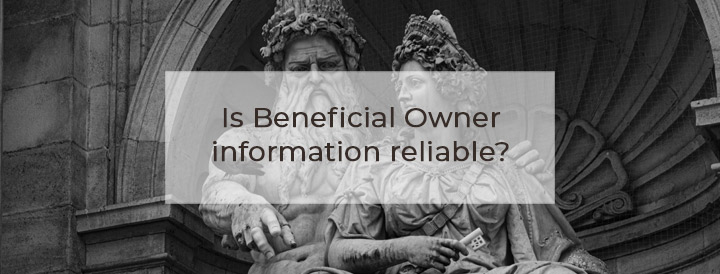- October 23, 2023
- Posted by: FCS Compliance
- Category: Art Market, News

Is the Ultimate Beneficial Owner information on Companies House reliable?
Written by Rena Neville, Head of FCS Compliance – Art Division

In answer to the question “Can we rely on Companies House to provide reliable information on Ultimate Beneficial Owners (UBOs)?”, I am afraid the answer is no. Indeed, the UK government has in the not-too-distant past acknowledged as much. This is true despite the fact that it is a criminal offence to provide false information to Companies House.
Thus, for Art Market Participants (AMPs) bound to conduct Customer Due Diligence (CDD) on UK companies, one of the bigger changes in the last year or so involves obtaining UBO information.
From the implementation of The 5th EU Anti-Money Laundering Directive in 2020, until 1 April 2023, most AMPs would simply visit the Companies House website, search for the company name, and click on the people tab. There it was possible to find a list of the company’s directors and persons within the business having significant control.
As a reminder, a person of significant control is one who:
-
- Directly or indirectly, holds more than 25% of the company shares or more than 25% of the voting rights of the relevant company
- Holds the right, directly or indirectly, to appoint or remove a majority of the board of directors of the company
- Has the right to exercise, or actually exercises, significant influence or control over the company
However, since 1 April 2023, this has all changed. An AMP is now obligated to collect directly from the UK company an excerpt of the company register that contains the full details of beneficial owners.
If the UK company customer claims not to have any UBOs, the AMP must check this by inspecting the company’s register. This may occur in situations in which there are numerous shareholders each of 25% or less. Points two and three above are intended to avoid someone intentionally owning fractionally less than 25% in order to avoid being designated as a Person of Significant Control (PSC). Failure to disclose a PSC may be a criminal offence both by the person and the company, as always, depending on the circumstances.
Having obtained the UBO information, the AMP must be alert to inconsistencies or discrepancies between the information provided by the AMP versus that which is publicly available on the Companies House listing.
If the AMP discovers a “material discrepancy” between the UBO information provided and that posted on Companies House, the AMP has a duty to report the discrepancy to the Registrar of Companies.
Given the importance of identifying the true owners of companies, the definition of material discrepancy is understandably fairly broad. Such a discrepancy is one that may reasonably be considered to be linked to money laundering or terrorist financing. Specific examples of material discrepancies include:
-
- a difference in name,
- the omission of a beneficial owner or person of significant control as well as
- inaccuracies regarding:
– nature of control
– date of birth
– nationality
– correspondence address
– date that the individual became a registrable person.
A material discrepancy may also be anything that is deemed to conceal “details of the business of the customer”. In common speak, attempts to hide the true identity of ultimate owners is a common tactic of money launderers, hence the emphasis on the need to fully disclose the beneficial ownership.
To sum up, the simple and practical implication of the changes this year are that AMPs must ask UK companies to share their UBO information, and must report any discrepancies to Companies House.
Article written October 2023

